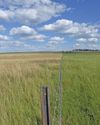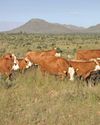Try GOLD - Free
Cassava: a largely ignored crop with huge potential in South Africa
Farmer's Weekly
|Farmer's Weekly 18 November 2022
Light Ngobeni and Zinhle Nkosi, agricultural economists and master's students at the University of Pretoria and the University of Limpopo respectively, write about the importance of cassava production for farmers and consumers in South Africa, and how to develop the value chain.
-

Cassava (Manihot esculenta), also known in some African countries as tapioca, mandioca, yuca or umdumbulu, was domesticated mainly on the south-western rim of the Amazon in South America. In the 16th century, when trade between Brazil and Africa began, Portuguese traders brought the crop to the Congo Basin. Two centuries later, it was introduced independently to East Africa and Madagascar.
Cassava is a root tuber similar to the sweet potato. It is drought-tolerant, grows in poor soil conditions, and requires little to no fertiliser. Cassava has been transformed from a 'poor man's crop' into a lucrative industrial crop, and is now processed into products such as starch, flour and glucose.
For processors, its key attributes are that it contains 70% starch by dry weight and is high in carbohydrates, making it an excellent crop for ethanol for industrial use and feeds for livestock. It is also used in medicine, adhesives and the paper industry.
Smallholder farmers in Africa cultivate and prepare cassava using conventional techniques such as planting cuttings vertically, planting freshly cut cuttings, and using intercropping during the crop's early growth stages with maize, beans and spinach.
The crop is grown and sold largely by resource-constrained farmers in their communities, where it provides much-needed income and employment.
Nigeria is the world's largest cassava producer (see table). While African countries are reported to have contributed 61% of global cassava production in 2018, South Africa is a major importer of cassava starch.

This story is from the Farmer's Weekly 18 November 2022 edition of Farmer's Weekly.
Subscribe to Magzter GOLD to access thousands of curated premium stories, and 9,500+ magazines and newspapers.
Already a subscriber? Sign In
MORE STORIES FROM Farmer's Weekly

Farmer's Weekly
The Vulture Lady of the Eastern Cape
For decades, Kate Webster has been involved in not only rehabilitating Cape vultures, but also fighting for their protection in an ever-increasing hostile environment. Mike Burgess spoke to her about her life's work.
3 mins
August 29 - September 05, 2025

Farmer's Weekly
Rural communities prefer other income streams above trophy hunting
A new study based on surveys conducted with over 1 500 households living around the Kruger National Park suggests that communities would rather seek alternative income streams, as opposed to trophy hunting.
2 mins
August 29 - September 05, 2025

Farmer's Weekly
ABC of animals buyers beware! Look out for disease
Dr Jenny Turton gave advice on animal health at a farmers' day held at the Onderstepoort Institution for Veterinarians.
3 mins
August 29 - September 05, 2025

Farmer's Weekly
High-density grazing on semi-arid grassland scrutinised
A study by University of the Free State researchers who compared high-density grazing to conventional rotational systems has underscored the complex interplay between grazing management, climate, and soil properties in determining soil carbon and vegetation dynamics
6 mins
August 29 - September 05, 2025

Farmer's Weekly
Poland set to introduce bill defending farmers against 'odours'
Polish Agriculture Minister Stefan Krajewski will reportedly introduce a bill to defend farmers against lawsuits regarding bad smells and noise coming from their farms, TVP World recently reported. This followed in response to a fine levied on pig farmer Szymon Kluka for the smells coming from his farm, TVP World said.
1 min
August 29 - September 05, 2025

Farmer's Weekly
Disease management and control starts at the farm gate
The ongoing foot-and-mouth disease (FMD) outbreak is not only affecting the beef industry but also dairy farmers, small stock producers, and potentially pig farmers. Dr Peter Evans, who is leading the Red Meat Industry Services' response effort, spoke to Sabrina Dean about FMD management and control.
7 mins
August 29 - September 05, 2025
Farmer's Weekly
Why onion and potato prices spiked and then normalised
Absa AgriBusiness highlights some of the factors impacting onion and potato market dynamics over the past five years.
2 mins
August 29 - September 05, 2025

Farmer's Weekly
RMIS latest report flags beef market risks
In the latest RMIS report, CEO Dewald Olivier discussed disease threats and a looming beef surplus. Octavia Avesca Spandiel reports on market risks and strategies to protect South Africa's red meat sector.
2 mins
August 29 - September 05, 2025

Farmer's Weekly
Dormer sheep: muscle museums that boost meat production
High fertility and robust growth make the Dormer sheep breed ideal for meat production. Lanie Coetzer, owner of the Labarie Dormer stud, explained to Lindi Botha how genetic selection ensures optimal success.
8 mins
August 29 - September 05, 2025

Farmer's Weekly
Dormers: when quality meat really does count
The Kinko Dormers stud near Swellendam in the Western Cape is proving that precision breeding, backed by performance data, can deliver measurable financial advantages. Johan Swart, the owner of the stud, spoke to Glenneis Kriel about his breeding philosophy and the performance-driven approach behind his success.
6 mins
August 29 - September 05, 2025
Translate
Change font size
